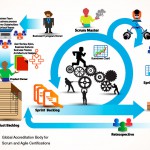Sprint Retrospective is a meeting convened by the Scrum Master in which the team talks about the previous sprint and decided on how to make the next sprint productive. This meeting differs from a Sprint Review meeting. In Sprint review meeting the team looks into what the team is currently working on whereas the Retrospective meeting talks about how they are working.
The team discusses on processes , communication, environment, artefacts and tools, practices.
Scrum is a framework that needs to be adjusted appropriately for a project, team and circumstance. The Sprint Retrospective meeting is a valuable instrument that allows a team to constantly develop and progress throughout the project.
In Scrum it is very key for all team members including the Product owner and Scrum Master to get an opportunity to voice their opinion in an truthful atmosphere. In some cases it may be beneficial to get an external enabler to attain the maximum advantage from retrospective. Also in cases where emotional conflicts are present in the team an impartial facilitator could be of help.
The duration of this meeting is usually time boxed to 3 hours and The participants of the meeting would be team members, product owner and scrum Master. However the attendance of the product owner is uncomplelled.
The meeting concentrates and getting anbswers on the below questions:
The positives during the sprint
How to improve the next Sprint
Irrespective of who joins the meeting , the atmosphere for Sprint Retrospectives must be harmless for participants. This infers that participants are required to be truthful and must be honest and apparent while considering others with respect. Issues performance and improvement can flare up in retrospectives. This can be handles by having a professional facilitator in the meeting.
Sprint Retrospectives are basically a method used to divulge the practices and activities of the Team to itself. It is considered that when a self organising team is self aware , it provides opportunities to correct one-self and improve. When a self-organizing system becomes self-aware, it self-corrects and deliberately improves when given the tools to do so.
However an ineffectively run Sprint Retrospective can do more harm than good to the team. It unnecessarily consumes the time of the team and can also be destructive to the team. Hence as stated earlier a professional facilitator is recommended to conduct the meeting at least when the team is newly following Scrum.
When Sprint Retrospectives work well, the team becomes more focused and productive. Excellent teams do not simply appear. They evolve over time and Sprint Retrospectives are a key ingredient in for this.









